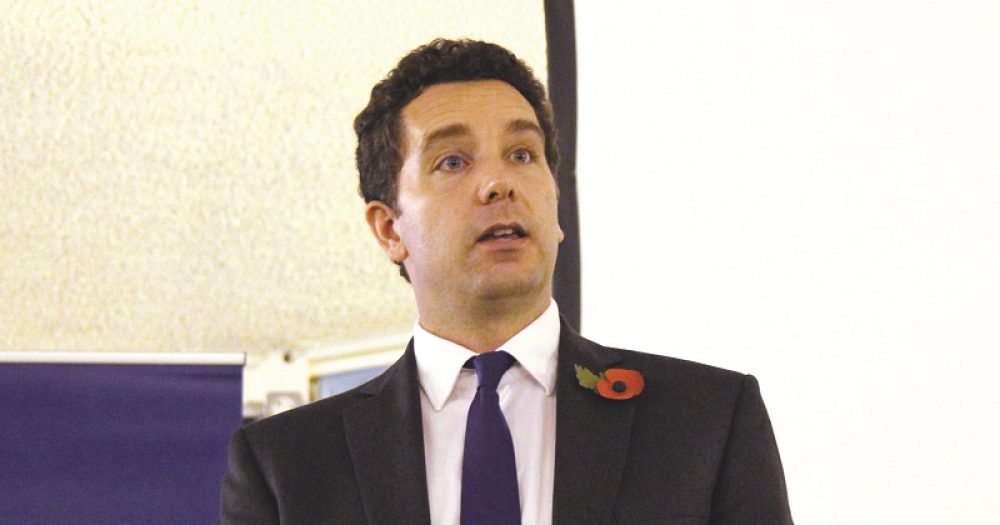Academy trusts will be judged on their schools’ Ofsted ratings, published performance measures on progress and attainment and their improvement over time before being allowed to expand as part of new “health checks”, the government has said.
Nicky Morgan, the former education secretary, has previously said that trusts without a record of school improvement will not be allowed to expand, and the national schools commissioner Sir David Carter confirmed last month that a new health check he was introducing for chains would look at their history of “raising standards”.
Edward Timpson, a minister at the Department for Education, has shed more light on what officials will look for in academy trusts before allowing them to take on more schools after fears were raised that a lack of evidence of improvement could hold some large trusts back from expansion because few of their schools have been inspected since conversion.

Timpson’s response to a written question from Stephen Timms, the former schools minister, represents the government’s most complete answer to the question of exactly how trusts will be assessed to date.
Timpson said it was up to the relevant regional schools commissioner to decide whether or not to approve a bid by a trust to expand, but added that commissioners “would want to be assured that the governance and leadership of the MAT is clear and robust and that the MAT has the capacity to drive improvement across all schools within it”.
“Consideration will include, amongst other things, Ofsted judgements and published performance measures in relation to progress and attainment of academies already within the MAT, how these relate to the floor standard, and national and local averages, as well as improvement over time,” he said.
“The RSC will also consider the performance of the academy applying to join the MAT.”
Timms, the MP for East Ham who served as minister of state for schools under the Blair government between 2001 and 2002 while Estelle Morris was the education secretary, said he welcomed the detail in Timpson’s response, and said the government should prioritise the improvement of schools over the expansion of the academies programme.
“My main concern is that the trusts which do expand should be those that have got the capacity to do what is needed,” Timms told Schools Week.
“The government is resting all its hopes for school standards on academisation, but there is evidence that for a lot of schools simply becoming an academy doesn’t help, and I think a big part of the reason it’s not delivering is because quite a lot of trusts have expanded too quickly.”
While tougher checks on trusts wanting to expand has been cautiously welcomed in the wake of criticism of chains like E-ACT and AET which have been accused of growing too rapidly and banned from taking on new schools, some have questioned whether there will be enough eligible trusts to cope with the growth of the academies programme.
The government has said it still wants to see all schools become academies, despite having u-turned on its plans to force the change, and announced in May that it would target schools in “underperforming” and “financially viable” local authority areas for forced conversion.
Fears about the supply of good trusts have been further exacerbated by the findings of recent research by the Education Policy Institute, which show that 20 of the largest multi-academy trusts fell “significantly below” the national average for improving pupils’ attainment.
Timms accepted there was an “issue” with the supply of chains, but said the answer “may be that the government may need to slow down the pace of its academisation”.








Nobody has yet addressed the issue of the failing academies that no MAT wants to take on, such as Baverstock in Birmingham (see http://www.birminghammail.co.uk/news/midlands-news/watch-kids-school-faces-closure-11665521#ICID=sharebar_twitter) As the pupils rightly ask in their campaign song, “Where we gonna go?” Any thoughts, Ms Greening?
This is indeed a major question which has not been answered by the DfE, and it’s not just about schools failing in an educational sense. There are many schools which have been underinvested in and require millions of pounds just to make the buildings legally compliant – surely no MAT will take on such a liability which it would have to fund out of its other schools’ budgets.
If indeed Baverstock does close, which would be unquestionably represent a failure, then there should be an objective review of why it had become such an educational/financial problem that no other MAT would take it on. Was it due to the three years the school was run by Leap Academy Trust or the decades (?) before that when it had been run as a Foundation School. I don’t know the answer, and we should avoid premature assumptions …
In 2009, Ofsted judged the Baverstock Foundation School and Special Sports College to be Satisfactory having improved significantly from an earlier poor inspection. In 2012, the College was reinspected and found Satisfactory again. It became an academy May 2013 with the Leap Academy Trust. In September 2014 it was judged Inadequate. The fifth monitoring report in June 2016 found the academy wasn’t taking effective action to get out of special measures.
It appears, then, the school had improved since an Inadequate ruling in the early 2000s but then fell back once it became an academy. It’s a matter of concern than no other MAT will come forward to take it on. This is a major flaw of the academy programme and suggests MATs will only take over schools which are likely to improve.
Perhaps the local authority should be allowed to take it over and save it from closure.
So while under local authority control the school was rated either Inadequate or Requires Improvement (using the current terminology). As an academy the school has been rated either Inadequate or Requires Improvement. Neither of these should be considered acceptable. On the basis that surely all schools should be at least Good, why would the LA taking it over mean that this is more likely given they weren’t able to do it before over all the years they ran the school?
As for your other statement, MATs will only take over schools which THEY BELIEVE they can improve. If they didn’t think they could improve the school then they shouldn’t be taking it on in the first place. Many school-based MATs are focused on taking on Inadequate and RI schools and turning them round but it has to be the right fit.
Hi Janet, have you got an answer to the above questions?